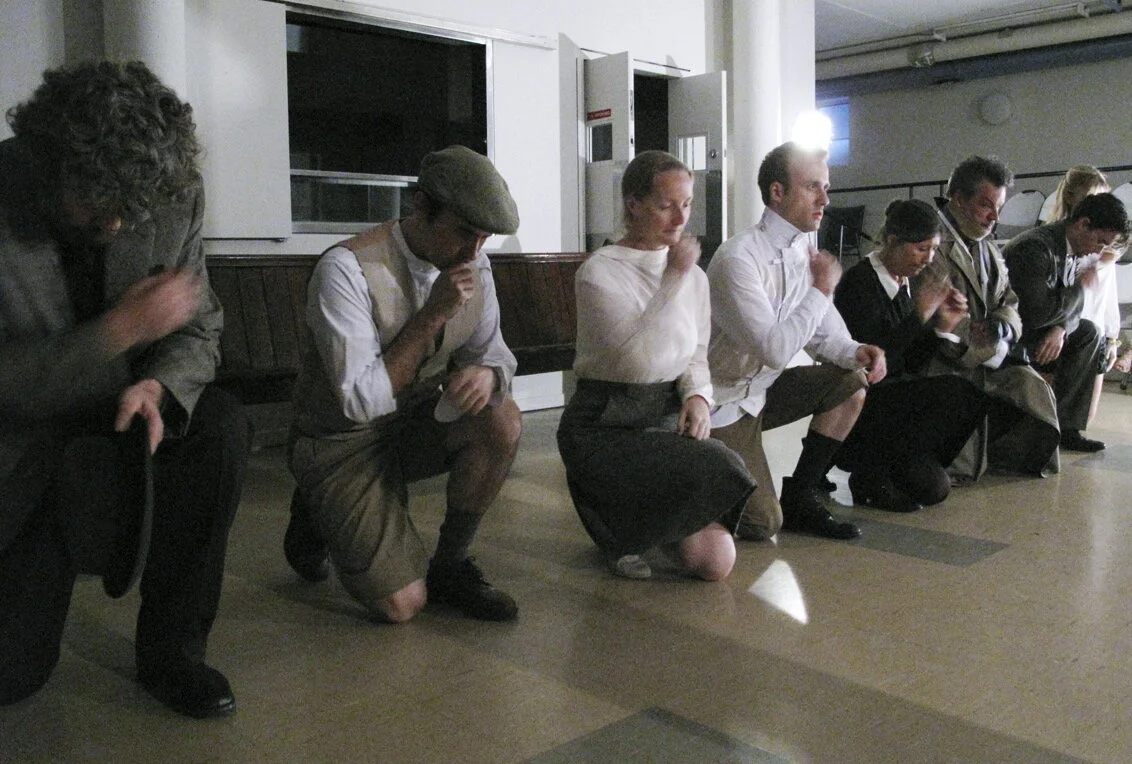PURgatory in ingleton (Fegefeuer in Ingolstadt)
by Marieluise Fleißer
translated + directed by Birgit Schreyer Duarte
SummerWorks Performance Festival 2013
The anglican Church of the epiphany and ST MARK, Toronto
August 8-18, 2013
Cast
OLGA Miranda Calderon. BEROTTER, her Father / GERVASIUS, an individual Jeff Culbert. HERMINE / FIRST STUDENT Anna Hardwick. MRS. ROELLE, Roelle’s Mother Kyra Harper. CLEMENTINE, Olga’s sister / THIRD STUDENT Helen Juvonen. ROELLE Jordan Mechano. PEPS / SECOND ALTAR BOY / CRUSIUS Benjamin Muir. PROTASIUS, an individual David J. Phillips. CHRISTIAN, Olga’s brother / FIRST ALTAR BOY / SECOND STUDENT Tyler Séguin.
Creative team
Set Helen Yung. Lighting C.J. Astronomo. Costumes + Props Michelle Tracey and Amanda Wong. Sound + Additional Composition Sam S. Sholdice. Stage Manager Nicole de Angelis. Movement + Fight Choreography Thomas Morgan Jones. Research + Dramaturgical Assistance Cathrin Winkelmann and Annette Schreyer. Musical Consultant Stephen Hamelink. Producers ted witzel (the red light district) and Birgit Schreyer Duarte (Storm &nd Stress). Poster Design Louis Schreyer Duarte. Poster Imagery courtesy of Nicola Samorì. Photography Annette Schreyer.
This translation was made possible through the support of The Ontario Arts Council and The Shaw Festival.
The [play’s] theatrical poetry
lies in the fact that the characters all have something monstrous about them, that they are constructs. They mustn’t appear too naturalistic. To show the obscurity, the ultimate incomprehensibility of humans, is essential.”
Marieluise Fleißer
"[Fleisser]'s feverish 1924 drama Purgatory in Ingleton has been translated and directed with phantasmagoric flair"
J. Kelly Nestruck, The Globe and Mail
Director’s NoteS
My interest in translating and staging this play is two-fold: firstly, to continue my exploration of the effect of language (on the speaker and the recipient in the play as well as on the audience), as I have done with my previous projects The Piano Tuner and Kaspar & the Sea of Houses. Secondly, I wanted to examine the role of religion in our lives—currently largely a taboo topic, so it seems to me, in contemporary Canadian culture—and the abuse of religious faith. While spirituality and organized religion can provide comfort and meaning, when used as a political or personal tool for oppression it can become fatal as we have seen over the centuries, to this very day. So what can religious structures still provide today, and for our generation? Do we no longer believe in the necessity of a spiritual element in our lives, and what are the consequences? Or are we in fact longing for the connection to a divine force again, to make sense of our world? And: what does “purgatory” mean for each of us individually, in our day?
Unable to break free from the fetters of the Catholic church and provincial petty bourgeoisie ideologies, the small town students in Purgatory are too constrained and damaged to feel, love and communicate effectively. They lack the imagination and education to question passed-down traditions and structures and to turn them into a meaningful basis for a life in a truly humanist or Christian spirit. The psychological deformations the author unveils in her misguided characters are paralleled in a “deformed”, abused language. It becomes the characters’ tool for subjugation and the prevention of successful individualism. Thus, language fails in its functions of enabling identity and community, instead reinforcing their existing prison of miscommunication, verbal injuries, blind self-defense and, ultimately, self-alienation. My challenge was thus to create a translation that honors the constructed-ness and foreignness of Fleißer’s images and phrases and translates them into an English language register that startles the spectator and still allows them to recognize familiar speech and behavioural patterns. Birgit Schreyer Duarte
"Purgatory was harrowing (...as it should be...)"
"my favourite of the 20 some shows I saw at this year's festival"
"fascinating, difficult, hilarious, and arresting"
"dynamic, enticing …the use of space had a great creepy and uncanny flow to it"
"stylish, challenging, and beguiling"
"strangely captivating"
"the performances are committed and complex"
"Duarte brings forward an atmosphere and poetry in the text, and her obviously close relationship with the text pays off in the vocal performance of her actors. Their pacing, timing, and delivery working to serve the bleak poetry of the text"
"If you don't go see it at SummerWorks you might never see it done in Canada again!"
"Why would someone put on such a challenging play, in a challenging space? Why would an audience member want to see it? Want to "work" with the performance instead of just consuming it? Because sometimes, like this time, it is worth it." Jason Silzer, stagedintoronto














